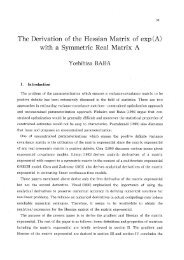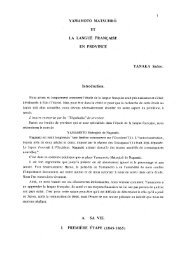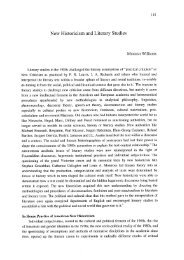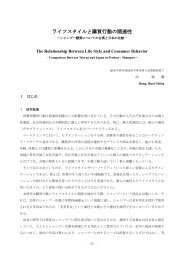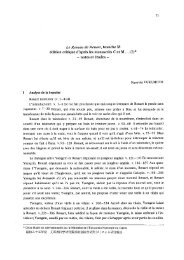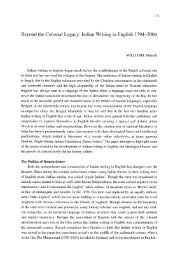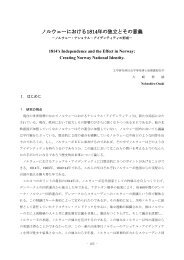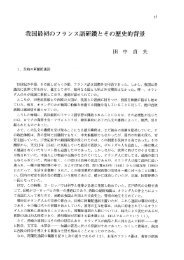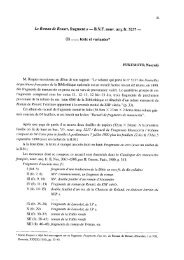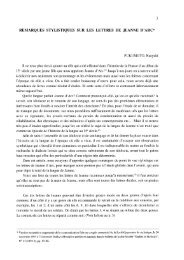vision and methodology in the new economics of global ...
vision and methodology in the new economics of global ...
vision and methodology in the new economics of global ...
You also want an ePaper? Increase the reach of your titles
YUMPU automatically turns print PDFs into web optimized ePapers that Google loves.
March 1982 Vision <strong>and</strong> Methodology <strong>in</strong> <strong>the</strong> New Economics67<br />
tions <strong>of</strong> <strong>global</strong> model<strong>in</strong>g, especially noteworthy achievements <strong>in</strong> econometrics have been<br />
made by Lawrence Kle<strong>in</strong> <strong>of</strong> <strong>the</strong> University <strong>of</strong> Pennsylvania <strong>in</strong> <strong>the</strong> United States.<br />
Kle<strong>in</strong>, who is currently organiz<strong>in</strong>g "Project LINK" at a <strong>global</strong> level, has <strong>in</strong> coopera-<br />
tion with universities, central banks <strong>and</strong> <strong>in</strong>ternational organizations developed a system<br />
to make short-term forecasts <strong>of</strong> <strong>the</strong> world economy, by means <strong>of</strong> l<strong>in</strong>k<strong>in</strong>g on an <strong>in</strong>ter-<br />
national scale economic models for various <strong>in</strong>dividual countries. Unlike previous at-<br />
tempts at bus<strong>in</strong>ess cycle forecasts which took as <strong>the</strong>ir objects <strong>of</strong> study <strong>the</strong> economies<br />
<strong>of</strong> s<strong>in</strong>gle countries, Project LINK is dist<strong>in</strong>guished by <strong>the</strong> fact that it carries out, from<br />
a <strong>global</strong> perspective, forecasts for <strong>the</strong> world economy. For this reason it may be<br />
called an appropriate <strong>methodology</strong> for <strong>the</strong> current age which <strong>the</strong> author has called <strong>the</strong><br />
"age <strong>of</strong> <strong>global</strong>ization<br />
." In <strong>the</strong> 21st century Project LINK <strong>and</strong> similar undertak<strong>in</strong>gs<br />
will no doubt be seen by people as very ord<strong>in</strong>ary th<strong>in</strong>gs, given <strong>the</strong> fur<strong>the</strong>r develop-<br />
ment <strong>of</strong> computers along with <strong>the</strong>ir s<strong>of</strong>tware <strong>and</strong> peripheral equipment, <strong>and</strong> given <strong>the</strong><br />
likely progress <strong>in</strong> technology for <strong>the</strong> transmission <strong>of</strong> large amounts <strong>of</strong> <strong>in</strong>formation,<br />
us<strong>in</strong>g artificial satellites <strong>and</strong> o<strong>the</strong>r <strong>new</strong> means. Econometrics has thus come forward<br />
as a powerful tool that radically supersedes former <strong>the</strong>oretical models based on abstract<br />
deductive methodologies.<br />
Never<strong>the</strong>less, it cannot be denied that econometrics, <strong>in</strong> addition to its strong po<strong>in</strong>ts,<br />
also has some weaknesses. For example, econometric methods have been burdened with<br />
considerable difficulties <strong>in</strong> relation to historical approach <strong>and</strong> long-term outlook (<strong>the</strong><br />
importance <strong>of</strong> which has been emphasized by Marx among o<strong>the</strong>rs), <strong>and</strong> especially <strong>in</strong><br />
regard to how to h<strong>and</strong>le changes <strong>in</strong> "system structure." Given <strong>the</strong> fact that future<br />
forecasts us<strong>in</strong>g an econometrics model are based on various types <strong>of</strong> "structural para-<br />
meters" derived from past data over a period <strong>of</strong> years, a chronic source <strong>of</strong> vexation<br />
is <strong>the</strong> tendency for structural parameters derived from past data not to rema<strong>in</strong> un-<br />
chang<strong>in</strong>g <strong>and</strong> <strong>of</strong> constant relative importance forever <strong>in</strong>to <strong>the</strong> future. This is because<br />
<strong>the</strong> economic society around us is a fluid, changeable one <strong>and</strong> not a rigid society where<br />
structural parameters are permanent <strong>and</strong> unchang<strong>in</strong>g.<br />
Of course some structural parameters will have a very high degree <strong>of</strong> stability over<br />
time, but econometrics models never<strong>the</strong>less face <strong>the</strong> dilemma that certa<strong>in</strong> o<strong>the</strong>r struc-<br />
tural parameters are very changeable, thus pos<strong>in</strong>g a problem <strong>in</strong> forecast<strong>in</strong>g. Indeed,<br />
forecasts <strong>of</strong> <strong>the</strong> future us<strong>in</strong>g econometrics methods are always threatened by this type<br />
<strong>of</strong> defect. In <strong>the</strong> case that <strong>the</strong> world economy should , for example, fall <strong>in</strong>to great<br />
confusion due to an unforeseen "oil crisis" or some o<strong>the</strong>r reason, forecasts by this<br />
method would be extremely difficult.



